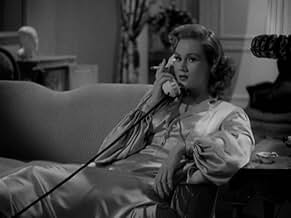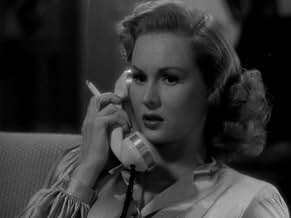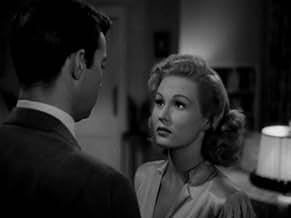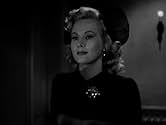AVALIAÇÃO DA IMDb
6,5/10
1,1 mil
SUA AVALIAÇÃO
Adicionar um enredo no seu idiomaMob attorney Walter Colby is manipulated by showgirl Flaxy Martin into taking the rap for a murder committed by mobster Hap Richie's goons, but he escapes and tries to get revenge.Mob attorney Walter Colby is manipulated by showgirl Flaxy Martin into taking the rap for a murder committed by mobster Hap Richie's goons, but he escapes and tries to get revenge.Mob attorney Walter Colby is manipulated by showgirl Flaxy Martin into taking the rap for a murder committed by mobster Hap Richie's goons, but he escapes and tries to get revenge.
Leah Baird
- Tenement Resident
- (não creditado)
Marjorie Bennett
- Nora's Neighbor
- (não creditado)
Paul Bryar
- Policeman with Witness
- (não creditado)
Jack Cheatham
- Police Dispatcher
- (não creditado)
Edgar Dearing
- State Trooper
- (não creditado)
John Elliott
- Judge Edward R. McVey
- (não creditado)
Creighton Hale
- George
- (não creditado)
John Harmon
- Fred Banford
- (não creditado)
Eddie Hart
- Detective with Nora
- (não creditado)
Avaliações em destaque
This film starts with overconfident Scott foolishly taking the fall for Virginia Mayo. He ends up in prison and subsequently escapes. He ends up on the run and virtual stranger Dorothy Malone decides to upend her life and follow him.
Strange plot, strange character motivations make this unbelievable, yet it is still entertaining as a B noir.
Strange plot, strange character motivations make this unbelievable, yet it is still entertaining as a B noir.
Catch that great scene where Flaxy (Mayo) beats up a blackmailing Peggy, (Westcott) with the timid hotel clerk hovering outside the door. Big-eyed Westcott really delivers in spades. Too bad the rest of the movie fails to reach that intense level. Looks to me like Warner Bros. used the film as an A-team try-out for cast principals and director. Now, Scott, for one, comes through perfectly as the lawyer with a wobbly compass— I'm just sorry this fine, exotic actor never got the recognition his talent deserved. The material, however, with its nifty double- cross, really merited an A-team director, like Walsh or Curtiz. Instead, the studio gave featurette director Richard Bare a shot, and the result shows he had little feel for the dark material.
Unfortunately, the movie is inferior grade noir, lacking in both style and edge. Take the early scene where Walt (Scott) and Hap (Kennedy) iron out wrinkles in the plot to free Caesar (Overman) from a murder rap. They're standing stock still in Hap's living room, talking, and that's the trouble: they stand stock still for about two minutes doing little more than delivering their lines. Thus, a potentially dramatic scene of rivalry calling for an expressive dynamic falls flat, drained of needed energy and tension.
But Bare seems most at sea in directing the lead actresses. Mayo looks lost in her key scenes with Scott— the second side of Flaxy's devious personality, the calculating side, fails to appear, and thus we're left with a very pretty girl speaking the lines, but without the necessary depth. Catch Malone too in the graveside scene. She's an unsophisticated librarian staring into the open pit of her own doom, but judging from the absence of needed emotion, she might as well be reading a book. Now, Malone later proved a fine actress of many dimensions, (e.g. Written on the Wind {1955}). Here, however, she's stuck in a thankless good girl role, so likely director Bare is at fault for not giving her the necessary cues. I suspect the movie would have improved had actresses Malone and Mayo switched roles.
Then too, Walt's sudden turn-around with 40 grand in his pocket is awkwardly handled. Even an A-grade filmmaker would have trouble making this bit of Production Code hokum believable, but in Bare's hands it comes across as little more than a clumsily developed happy ending. Thus, it's not surprising that the studio returned the director to making the humorous shorts he was so good at following this failed experiment. I also better understand why editors Silver and Ward omitted this entry from their highly successful tome Film Noir. Unfortunately, the movie may have all the trappings of the genre, but like bread dough in the hands of a neophyte baker, the loaf simply fails to gel.
Unfortunately, the movie is inferior grade noir, lacking in both style and edge. Take the early scene where Walt (Scott) and Hap (Kennedy) iron out wrinkles in the plot to free Caesar (Overman) from a murder rap. They're standing stock still in Hap's living room, talking, and that's the trouble: they stand stock still for about two minutes doing little more than delivering their lines. Thus, a potentially dramatic scene of rivalry calling for an expressive dynamic falls flat, drained of needed energy and tension.
But Bare seems most at sea in directing the lead actresses. Mayo looks lost in her key scenes with Scott— the second side of Flaxy's devious personality, the calculating side, fails to appear, and thus we're left with a very pretty girl speaking the lines, but without the necessary depth. Catch Malone too in the graveside scene. She's an unsophisticated librarian staring into the open pit of her own doom, but judging from the absence of needed emotion, she might as well be reading a book. Now, Malone later proved a fine actress of many dimensions, (e.g. Written on the Wind {1955}). Here, however, she's stuck in a thankless good girl role, so likely director Bare is at fault for not giving her the necessary cues. I suspect the movie would have improved had actresses Malone and Mayo switched roles.
Then too, Walt's sudden turn-around with 40 grand in his pocket is awkwardly handled. Even an A-grade filmmaker would have trouble making this bit of Production Code hokum believable, but in Bare's hands it comes across as little more than a clumsily developed happy ending. Thus, it's not surprising that the studio returned the director to making the humorous shorts he was so good at following this failed experiment. I also better understand why editors Silver and Ward omitted this entry from their highly successful tome Film Noir. Unfortunately, the movie may have all the trappings of the genre, but like bread dough in the hands of a neophyte baker, the loaf simply fails to gel.
Zachary Scott has most of the best lines and Virginia Mayo gets the complete glamor treatment in the title role of FLAXY MARTIN. Both of them score heavily in this tight little crime melodrama that suffers only when the plot's loopholes begin to show. Dorothy Malone gets third billing as the wholesome librarian who sticks her neck out to help a man she almost runs over on a dark and stormy night. Her motivations for taking him in and then discovering he's a man on the run from the law are never completely believable.
Nor is the way Scott tries to shield Mayo from the police by pretending that he's the man who murdered a woman the mob wanted to get rid of. He's a lawyer for the gangsters and sticks his own head into a noose by thinking that he can back himself into a corner and then get out.
But aside from these plot contrivances that don't ring true, the story about a lawyer being double-crossed by the gangsters he was protecting is tight and suspenseful. The supporting cast includes Douglas Kennedy, Elisha Cook, Jr., Tom D'Andrea and Douglas Fowley, all well-used and fitting into the noir-like atmosphere of the melodramatic turn of events.
The amusing tough guy talk from Zachary Scott gets the kind of delivery that shows he was a very capable actor who deserved more recognition with better roles in A-films. He's excellent here and Virginia Mayo is so convincing as a scheming tramp that it makes me think Bette Davis was right when she told Warner Brothers they should have offered the role of Rosa Moline in "Beyond the Forest" to Mayo. She's that good.
Nor is the way Scott tries to shield Mayo from the police by pretending that he's the man who murdered a woman the mob wanted to get rid of. He's a lawyer for the gangsters and sticks his own head into a noose by thinking that he can back himself into a corner and then get out.
But aside from these plot contrivances that don't ring true, the story about a lawyer being double-crossed by the gangsters he was protecting is tight and suspenseful. The supporting cast includes Douglas Kennedy, Elisha Cook, Jr., Tom D'Andrea and Douglas Fowley, all well-used and fitting into the noir-like atmosphere of the melodramatic turn of events.
The amusing tough guy talk from Zachary Scott gets the kind of delivery that shows he was a very capable actor who deserved more recognition with better roles in A-films. He's excellent here and Virginia Mayo is so convincing as a scheming tramp that it makes me think Bette Davis was right when she told Warner Brothers they should have offered the role of Rosa Moline in "Beyond the Forest" to Mayo. She's that good.
Zachary Scott isn't a name on the tips of too many tongues these days, but in the late 40s he was a very busy boy. However, in his best remembered movies, like Mildred Pierce and Flamingo Road, he had the misfortune to play second fiddle to the domineering Joan Crawford; many of his roles, too, were as weaklings, leaving the false impression that he was a weak actor (his visage deeply waved hair, a Tomas E. Dewey mustache was considered quite dashing in the post-war years but now looks seriously passé, which doesn't help his legacy either).
Flaxy Martin preserves one of his stronger starring performances, as a mob mouthpiece who finds himself in over his head. He's been balking at his shady job as a syndicate lawyer for a long time, but his girl (Virginia Mayo, who takes the title role) keeps urging him to stick with it until he assembles a nice nest egg. Unfortunately, she's really the moll of syndicate kingpin Douglas Kennedy, stringing Scott along to keep him quiescent. When a murder by one of Kennedy's goons threatens to implicate Mayo, Scott takes the rap, confident that he'll get himself off. He didn't count on being double-crossed. The plot traces his rude awakening and plans for payback.
The movie mixes a lot of tight, hard scenes with some soft and sappy ones; the redemptive sub-plot with, as Scott's new love interest, Dorothy Malone (wasted yet again as a good girl) proves flat and superfluous. Mayo, along with Scott, has one of her better parts; she might have been one of the noir cycle's more memorable femme fatales had her acting skills been on a par with her pouty blonde looks. And Elisha Cook, Jr. contributes another turn as a bantam rooster barely bigger than his gun.
Flaxy Martin, along the the previous year's Smart Girls Don't Talk (also starring Mayo), marks a rare break for director Richard Bare, who from the early 40s until the late 50s and his passage into series television directed little but dozens upon dozens of `humorous' shorts with titles beginning `So you think you're...' and `So you want to be...'. They're a part of Hollywood better left undisturbed. The overlooked Flaxy Martin, on the other hand, ought to be a bit better known
Flaxy Martin preserves one of his stronger starring performances, as a mob mouthpiece who finds himself in over his head. He's been balking at his shady job as a syndicate lawyer for a long time, but his girl (Virginia Mayo, who takes the title role) keeps urging him to stick with it until he assembles a nice nest egg. Unfortunately, she's really the moll of syndicate kingpin Douglas Kennedy, stringing Scott along to keep him quiescent. When a murder by one of Kennedy's goons threatens to implicate Mayo, Scott takes the rap, confident that he'll get himself off. He didn't count on being double-crossed. The plot traces his rude awakening and plans for payback.
The movie mixes a lot of tight, hard scenes with some soft and sappy ones; the redemptive sub-plot with, as Scott's new love interest, Dorothy Malone (wasted yet again as a good girl) proves flat and superfluous. Mayo, along with Scott, has one of her better parts; she might have been one of the noir cycle's more memorable femme fatales had her acting skills been on a par with her pouty blonde looks. And Elisha Cook, Jr. contributes another turn as a bantam rooster barely bigger than his gun.
Flaxy Martin, along the the previous year's Smart Girls Don't Talk (also starring Mayo), marks a rare break for director Richard Bare, who from the early 40s until the late 50s and his passage into series television directed little but dozens upon dozens of `humorous' shorts with titles beginning `So you think you're...' and `So you want to be...'. They're a part of Hollywood better left undisturbed. The overlooked Flaxy Martin, on the other hand, ought to be a bit better known
Virginia Mayo is a man trap in "Flaxy Martin," a 1949 noir starring Zachary Scott, Dorothy Malone, Helen Westcott, and Tom D'Andrea.
Scott plays a mob lawyer Walter Colby, who's sick of the cases handed him by mobster Hap Ritchie (Douglas Kennedy). He's in love with Flaxy (Mayo), who is two-timing him with Hap, though Walter doesn't know that.
Flaxy talks him into staying until they have enough money to take off. When Walter finds out a witness (Westcott) was paid off to give an alibi to one of Hap's henchmen in a murder case, he threatens to go to the D. A. about it.
Before he knows it, with Flaxy's help, he's been framed for the witness' murder. He escapes from custody and, going on the run, meets Nora (Malone).
Compelling film with excellent performances by Mayo, Westcott, Malone, and Elijah Cook, Jr., as one of Hap's ruthless thugs.
Mayo is as cold as they come, sexy and convincing as she manipulates her men. It's always fun to see Tom D'Andrea, whom baby boomers remember as Gillis in "The Life of Riley" as well. He has a small role, but he's very good.
Zachary Scott is Zachary Scott - he has a strong film persona, a good speaking voice, and does tough well. He's not that slimeball Monty from "Mildred Pierce," though, just someone who works for a low-life.
Well worth seeing.
Scott plays a mob lawyer Walter Colby, who's sick of the cases handed him by mobster Hap Ritchie (Douglas Kennedy). He's in love with Flaxy (Mayo), who is two-timing him with Hap, though Walter doesn't know that.
Flaxy talks him into staying until they have enough money to take off. When Walter finds out a witness (Westcott) was paid off to give an alibi to one of Hap's henchmen in a murder case, he threatens to go to the D. A. about it.
Before he knows it, with Flaxy's help, he's been framed for the witness' murder. He escapes from custody and, going on the run, meets Nora (Malone).
Compelling film with excellent performances by Mayo, Westcott, Malone, and Elijah Cook, Jr., as one of Hap's ruthless thugs.
Mayo is as cold as they come, sexy and convincing as she manipulates her men. It's always fun to see Tom D'Andrea, whom baby boomers remember as Gillis in "The Life of Riley" as well. He has a small role, but he's very good.
Zachary Scott is Zachary Scott - he has a strong film persona, a good speaking voice, and does tough well. He's not that slimeball Monty from "Mildred Pierce," though, just someone who works for a low-life.
Well worth seeing.
Você sabia?
- CuriosidadesComposer William Lava repeatedly uses a five-note melody cribbed or "sampled" directly from Alfred Newman's composition for the theme from King Vidor's romantic drama No Turbilhão da Metrópole (1931). This Newman theme was recycled for the theme for Quem matou Vicki? (1941) and it soon became a staple of the studio's noir dramas, used as an trope of of the Big City in films like Envolto na Sombra (1946), O Beijo da Morte (1947) and Uma Vida Marcada (1948).
- Erros de gravaçãoRoper and Caesar continually address Colby (a lawyer) as "Shamus". A shamus is a private eye; the word they likely meant to use is "shyster".
- Citações
Hap Richie: She's a great kid. You can always trust her to double-cross you.
- ConexõesReferenced in Jogo Duplo: Cast in Steele (1984)
- Trilhas sonorasSouth American Way
(uncredited)
Music by Jimmy McHugh
[Played on the piano when Flaxy and Walt arrive at Hap's party]
Principais escolhas
Faça login para avaliar e ver a lista de recomendações personalizadas
- How long is Flaxy Martin?Fornecido pela Alexa
Detalhes
- Data de lançamento
- País de origem
- Centrais de atendimento oficiais
- Idioma
- Também conhecido como
- L'amante del gangster
- Locações de filme
- Empresa de produção
- Consulte mais créditos da empresa na IMDbPro
- Tempo de duração1 hora 26 minutos
- Cor
- Proporção
- 1.37 : 1
Contribua para esta página
Sugerir uma alteração ou adicionar conteúdo ausente

Principal brecha
By what name was A Máscara da Traição (1949) officially released in India in English?
Responda




































